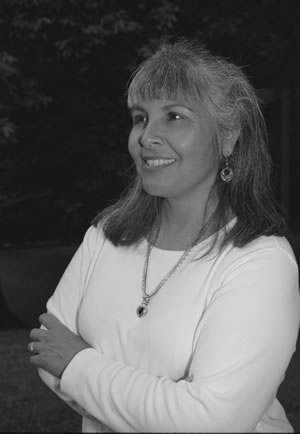Elena Rodriguez
Idaho Latinas and their families have the indefatigable Elena Rodriguez to thank for many of their health and social services. Elena coordinates services for farmworkers and runs the Child Health Insurance Program at Terry Reilly Health Services, one of the few clinics where primary health care is available for migrant laborers who toil in rural areas around Boise. As president of Mujeres Unidas, an all-volunteer Latina group, Elena takes on the tough challenge of combating domestic violence and alcoholism in the community and encourages young Latinas to become leaders.
When Elena Rodriguez was a young mother with two small children living in southern California, a high school friend who had become a public health nurse asked her to volunteer as a translator during visits to a nearby Indian reservation. Despite a substantial Hispanic population, the county had few Spanish-speaking employees – no surprise to Elena who knew that, when she was growing up there, the names of Hispanic children were anglicized and speaking Spanish was punished. This first, small project led Elena Rodriguez to her life’s mission.
Twelve years ago, she settled in Boise and signed on as a volunteer at Terry Reilly Health Services. Though she is neither a nurse nor a social worker, Elena took the clinic’s services out into the fields, creatively promoting preventive medicine to migrant and indigenous communities who believe that sickness or health is in God’s hands. She organizes health fairs at migrant labor camps, with screening for vision and hearing, tuberculosis, diabetes and breast cancer. She trains women to reach out to their neighbors, explains the benefits of children’s health insurance and pre-natal care, organizes exercise classes and holds home cooking parties to promote good nutrition and bring down the high incidence of diabetes.
Prejudice and hostility toward migrant farmworkers do not deter Elena. When ambulance drivers refused to drive to a migrant labor camp, Elena borrowed a hospital van and drove out herself. Overcoming the Hispanic community’s own taboos about family planning and women’s rights, she provides financing, transportation and translating help for women in need of reproductive health care. She has promoted parenting skills on Spanish-language radio and lobbied to secure a minimum wage for farmworkers.
When Elena and her youngest son became homeless for six months last year because of a house fire, she continued her work without interruption.
Elena is the only woman of color on the board of the Idaho chapter of the Susan Komen Breast Cancer Foundation and chair of its Public Education Committee.
She speaks movingly of the difficulties faced by young migrant women. “(These are) throw-away girls who come from the farther regions of Mexico. They are raped and robbed on the way up. Then they are supposed to get a job here and send the money back to Mexico and there isn’t anything here for them. These girls are continually abused…and the Department of Health and Welfare can’t help them because they are undocumented and don’t qualify for Medicaid. This is the group that is breaking my heart.”
Elena’s tireless struggle against adversity and prejudice and her genuine warmth have earned her the trust and loyalty of thousands of Latinas in Idaho for whom she has been a powerful advocate, provider and role model.
 Photo by Dorothea von Haeften
Photo by Dorothea von Haeften